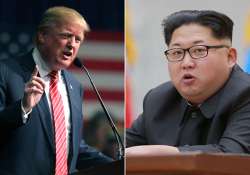Donald Trump open to meet North Korea's Kim Jong over nukes
Republican presidential candidate Donald Trump says he's open to speaking with North Korean leader Kim Jong Un to try to halt the communist nation's nuclear program.

Washington: Republican presidential candidate Donald Trump says he's open to speaking with North Korean leader Kim Jong Un to try to halt the communist nation's nuclear program.
"I would speak to him, I would have no problem speaking to him," Trump, the presumptive Republican nominee, said in an interview Tuesday.
"At the same time I would put a lot of pressure on China because economically we have tremendous power over China," he added.
It was unclear whether Trump was referring to bilateral talks between the U.S. and North Korea or a face-to-face meeting. But either would mark a significant departure from the current situation. There has been little dialogue between the U.S. and North Korea since Pyongyang pulled out of international aid-for-disarmament negotiations with the U.S. and other nations in 2008.
The Obama administration says it has been willing to resume those talks, but only if the North commits to the aim of giving up nuclear weapons. Kim Jong Un has instead doubled down on his nuclear program, holding two nuclear test explosions since he took power four years ago. He's also launched long-range rockets into space, intensifying fears that the North is moving closer to have a nuclear-tipped ballistic missile that could threaten the American mainland. In response, the U.S. has led the international effort to step up sanctions on the North.
Democratic front-runner Hillary Clinton's campaign jumped on Trump's remarks.
"Let me get this straight," said Clinton adviser Jake Sullivan. "Donald Trump insults the leader of our closest ally, then turns around and says he'd love to talk to Kim Jong Un?" Sullivan was referring to Trump's recent feud with British Prime Minister David Cameron.
Sullivan added: "I suppose that makes sense for him, since he also praised Kim Jong Un for executing his uncle and seems to have a bizarre fascination with foreign strongmen like (Russian President Vladimir) Putin and Kim. But his approach to foreign policy makes no sense for the rest of us."
No sitting U.S. president has met with the leader of North Korea, although former U.S. presidents have met with Kim Jong Un's predecessors on visits to the isolated nation. Jimmy Carter met in 1994 with Kim Il Sung, the current leader's grandfather — a meeting that paved the way for a disarmament agreement negotiated by the Clinton administration that later collapsed. Bill Clinton met with Kim Jong Il, the current leader's father, in 2009 when he traveled to Pyongyang to secure the release of two detained American journalists.
As a presidential candidate, Barack Obama was criticized by both Republican and Democratic rivals for saying he would be willing to meet with leaders of nations like Iran, Cuba and North Korea without preconditions. Hillary Clinton said at the time that Obama's position was naive and irresponsible.
Obama cast his position as a break from President George W. Bush's foreign policy and the notion that the U.S. could punish a country by not talking to its leaders.
Now in his eighth year as president, Obama has never met with North Korea's leaders. He has met with Cuban President Raul Castro, including in Havana this year, though their first meeting came only after negotiations between their countries about normalizing relations.
Obama was willing to meet with Iran's President Hassan Rouhani at the United Nations in 2013, but the Iranian leader turned down the meeting. The two did speak by phone days later, a call that came as the U.S. eyed nuclear talks with its longtime foe.
In the Reuters interview, Trump also called for a renegotiation of the Paris climate accord, a global effort aimed at reducing carbon emissions, and said that, if elected president, he would dismantle most of the Dodd-Frank financial regulations that were put in place after the financial crisis.
He also said he's planning to release a detailed policy platform on the economy in two weeks.